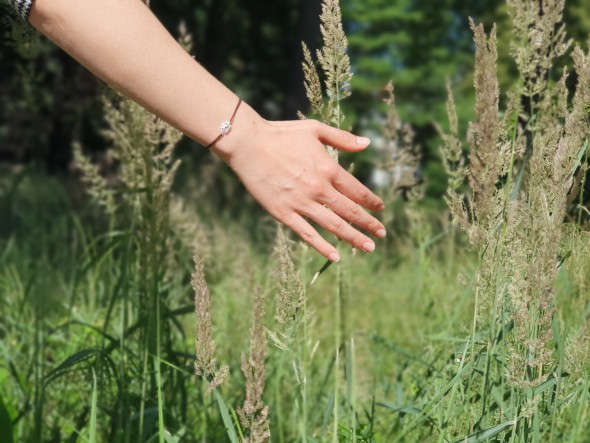Updated: 8th July 2022
Imke,
doctoral student in the Department of Mechanical Engineering
What drives us engineers is the thought that there has to be a better way. In research and in industry, of course, there are targets and goals. But it's also a fundamental thought that we all already carry within us as our own motivation.
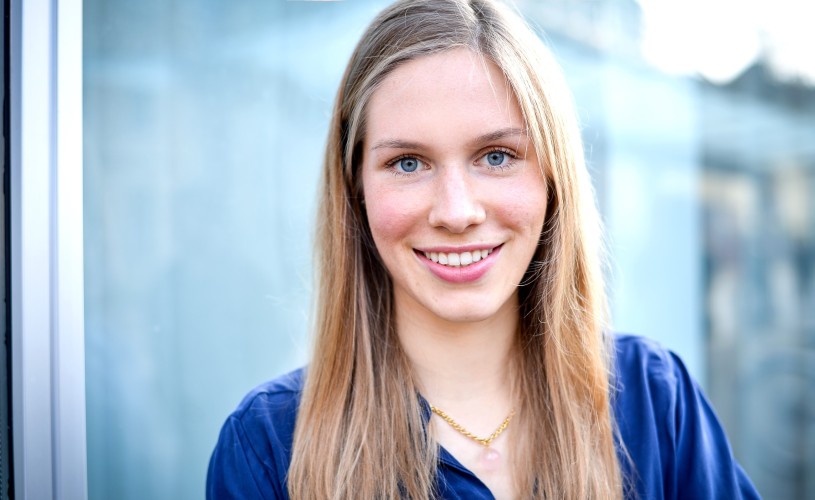
How does TU Darmstadt define sustainability for itself and what are the basic principles?
First off, we must clarify what sustainability means in its essence. After all, many varying aspects are subsumed under the term. The term sustainability is already very old: “It dates back to the 17th century and originally comes from forestry,” explains Prof.'in Dr. Anke Weidenkaff, Professor at TU Darmstadt with the subject area “Materials Chemistry/Material Technology and Resource Management” and Managing Director of the Fraunhofer IWKS. What was taken from the forest back then was initially gone. Reforestation of cleared areas was necessary to make the resources available again to the same extent for the so-called grandchild generations. This principle still applies today, but our lives and our economy have become much more complex since then. “We have a lot of waste products: Garbage that ends up in landfills or otherwise escapes and cannot be recaptured. For example, CO₂ emissions are currently a big problem and subsequently not sustainable. For us, the goal is therefore a sustainable circular economy. There, the resulting products are collected and then reused.” Ideally, then, there is no longer any waste; everything can be reused indefinitely or converted into new forms. How waste materials can be reused and new materials made more sustainable from the outset is the subject of Anke Weidenkaff's work in the Materials and Resources department.
What aspects were originally at the forefront of sustainability when we go back to the 17th century? On the one hand, of course, the preservation of the forest as an ecosystem, but also as a resource for humans for wood and food. And on the other hand, social responsibility towards future generations, who also depended on the forest. So it's about more than just environmental protection: sustainable action involves responsibility towards oneself and other people. TU Darmstadt and its research groups are therefore guided by the comprehensive sustainability goals of the United Nations. In addition to climate protection, clean water, clean energy, and sustainable consumption and production, health, the fight against poverty, economic growth, justice, and peace are also listed here. After all, we leave all of this to future generations, and we therefore bear responsibility. In total, there are 17 goals that the UN has formulated and to which it is committed.
The Sustainability Office: An address with many projects
For decades, there have always been university projects on sustainability and efforts to make the university more efficient, healthier, and environmentally friendly. Since 2020, there is now officially the Office for Sustainability, which bundles competencies and serves as a central contact point for students and employees.
The Office for Sustainability implements smaller and larger projects e.g., a collection station for old cell phones, bicycle repair stations around the university, and regular CO₂ balancing of the administration. The so-called Sustainability Compass also transparently documents which steps the TU Darmstadt has already implemented. For example, the reduction of CO₂ emissions. This is because the state of Hesse has set itself the goal of reducing its CO₂ emissions by 90% by 2050 compared to the year 1990 as part of its sustainability strategy. The TU, as part of the public sector, is aiming for a reduction of at least 2% per year, just like other universities. You will also find info on health management for staff and students and many other topics.
As a member of the network Universities for Sustainable Development in Darmstadt (HONEDA), the Office for Sustainability is well connected and informs people beyond university topics as well- for example at the next Sustainability Day on November 24, 2021. Because together we can create even more!
Research for a better future
The challenges are extensive and that is why there are many research groups and institutes at TU Darmstadt that deal with sustainability in their research. It is ideal if you are also interested in the topic, because here you can already help make existing systems more efficient and develop more sustainable methods during your studies.
Imke and Tim, for example, are conducting research at the Institute of Fluid Systems Engineering in the Department of Mechanical Engineering on how energy can be saved in water conveyance systems. They are part of the technical operations research team, focusing on two different areas of research and optimization of water delivery and distribution systems.
Imke is currently observing cities and their various influences on water supply. She is looking at the current state of a city's water supply, analyzing in which neighborhoods the demand is greater or less, and how well water systems can handle disruptions and other problems. It also determines how new neighborhoods in growing cities, for example, should be optimally connected to existing water supplies. To do this, she obtains data from urban water utilities, processes the data, and optimizes the supply structure in terms of its resilience, simplifying the water supply resistance to disruptions.
Tim is primarily concerned with industrial plants and their special demands on the water supply. This is because production plants often use large amounts of energy to move water for cooling and to treat polluted service water. In an industrialized country like Germany, this opens a lot of room for optimization and energy savings.
Tim,
a doctoral student in mechanical engineering
Pump systems seem unremarkable at first. But one third of the world's electricity consumption is used for pumps, fans, and compressors. 25% of the electricity demand in industry comes from pumps alone. There is tremendous potential for savings here.
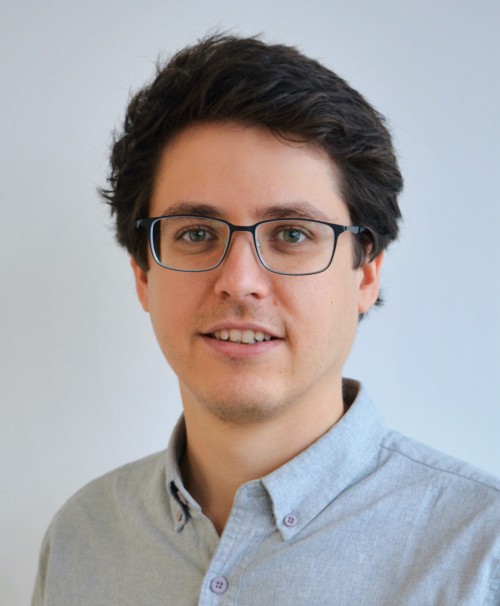
During their doctoral studies, Imke and Tim are also integrated into the teaching of the Department of Mechanical Engineering – Sustainable Engineering. Although the bachelor's degree mainly teaches the basics, sustainability is also a recurring topic there and is discussed in practical examples. “And what we have also initiated in the department is a lecture series on sustainability topics at the end of the bachelor's program. And in the master's program, you have the opportunity to listen to lots of topics on sustainability and to deepen focal points such as sustainable use of resources,” reports Imke.
Marcel,
is pursuing a PhD in Construction and Environmental Sciences
The construction industry is known for low resource efficiency and high energy consumption. It therefore offers great potential for optimization in these areas.
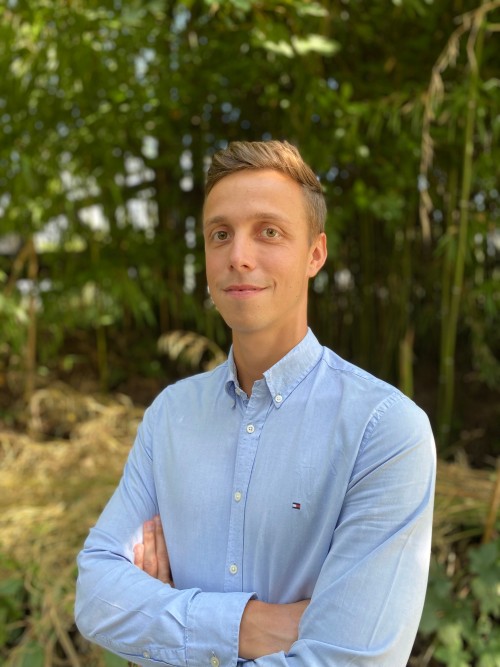
Here you can study sustainability!
Sustainability has many facets. Therefore, there is no one way to change the world. If you now feel like delving deeper into the topic of sustainability, there are several study programmes that could come into question.
We have put together a selection of degree programmes that deal with sustainability or offer special potential to enter the field as a career:
Paper Science and Technology – Paper Technology and Bio-based Fiber Materials M.Sc.
Sustainable Urban Development M.Sc.
Environmental Engineering B.Sc. /M.Sc.
Materials Science B.Sc. /M.Sc.
Mechanical Engineering Sustainable Engineering B.Sc. /M.Sc.
Energy Science and Engineering M.Sc.
Tropical Hydrogeology and Environmental Engineering M.Sc.
Applied Geosciences B.Sc. /M.Sc.
Civil Engineering B.Sc. /M.Sc.
Architecture B.Sc. /M.Sc. Example Decathlon House
Of course, there are other courses, such as biology, sociology, physics, electrical engineering, economics, and many more, that are related to sustainability in one way or another. Also, don't forget to check out the interdisciplinary majors, which can give you an interesting insight and overview.
Sustainable building: How will we plan our cities in the future?
But water and energy generation are not the only issues that will play a role in the future. The Department of Civil and Environmental Engineering is also increasingly dealing with challenges in urban planning. This is because urban neighborhoods in metropolitan areas are changing ever more rapidly today due to new urban planning needs.
The “RessStadtQuartier” research project, in which Marcel is involved, is concerned with the use of building materials. The team is developing tools that facilitate planning at the neighborhood level. This should make it possible to include resource efficiency more precisely in the replanning of urban neighborhoods at the municipal level. What does this mean exactly? When constructing new buildings or renovating existing ones, large amounts of energy are required to produce the necessary new materials and components. “RessStadtQuartier” views the existing building stock as a warehouse of materials and components. The raw materials already contained therein are released again during demolition or reconstruction and can be made available to the neighborhood again to the greatest possible extent. By considering the entire life cycle of neighborhoods instead of the individual buildings, a more sustainable use of resources and energy can be ensured. In this and other projects from the research focus “Energy and Resource Efficiency” of the department, the disciplines deal with their specific topics in order to advance sustainable development. However, the necessary knowledge is also imparted to students in teaching, thus giving them the opportunity to deal constructively with the topic of sustainability. The Sustainable Urban Development course of study deals particularly intensively with the topic of sustainability in urban development.
When it comes to sustainability, it is always important to go beyond!
Bei der Recherche zu diesem Beitrag ist uns ein Stichwort immer wieder begegnet: Interdisziplinarität. Besonders in einem Bereich, der so umfassend ist wie Nachhaltigkeitsforschung ist interdisziplinäres Arbeiten und Forschen superwichtig, denn nur gemeinsam lassen sich die ganz großen Probleme lösen. Dafür eignet sich das universitäre Umfeld besonders gut, findet Anke Weidenkaff. Denn die Uni beschäftigt Expert:innen in allen Fachbereichen, die sich gegenseitig unterstützen können. Besonders wichtig ist auch, dass Entwicklungen von Anfang an so angestoßen werden, dass die Lösung am Ende für alle sinnvoll ist. Sie nennt als Beispiel ihren Fachbereich Materialwissenschaft, denn neue Materialien müssen vor allem auch praktikabel in der Anwendung sein, damit sie später eingesetzt werden. In Forschungskooperationen arbeiten deshalb die Institute der TU Darmstadt und externe Institutionen eng zusammen. Vom Praktikum bis hin zur Promotion haben studierende in solchen Projektgruppen die Möglichkeit, in interdisziplinären Projekten mitzuarbeiten.
Prof. Dr. Anke Weidenkaff,
Professor TU Darmstadt, Department of "Materials Chemistry/ Materials Engineering and Resource Management/ Materials and Resources"
It is not enough to only have knowledge of materials science and about the chemical bonds and energetics of materials. In addition, you need knowledge about manufacturing and use of the materials. But you must work together in an interdisciplinary way. The engineers and the industries that then use these materials and build vehicles or computers from them have to be on board, otherwise it won't be implemented.
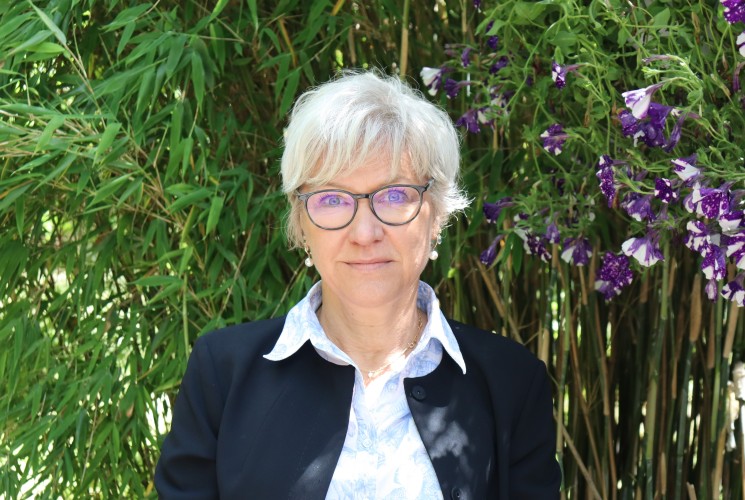
It's the same in other disciplines. Tim and Imke, for example, use mathematical optimization methods in their work. Thermoelectric materials that convert heat into electricity can in turn be used in cooling circuits.
TIP: The interdisciplinary courses (iSP) are therefore particularly exciting for anyone who wants to deal with sustainability in depth during their studies, as there are two exciting focus areas here: Environmental Science and Technology and International Development. In the lecture series and seminars on ecological, socio-political, and technical challenges, additional credits can be earned outside the regular curriculum. And brand new: The directory for all courses at TU on sustainability gives you the perfect overview of teaching on the topic.
The TU also faces challenges with its traffic concept, because in addition to electricity and heating, traffic currently accounts for a large proportion of the university's CO₂ emissions. The master's degree program in transportation is also specifically concerned with transportation and its challenges. But many other departments are also working on new concepts for traffic and mobility, especially electric and hydrogen vehicles.
“One of our topics at TU Darmstadt and Fraunhofer IWKS in Hanau is the hydrogen economy, based on sustainable hydrogen e.g., as a new fuel for fuel cells,” says Prof. Dr. Weidenkaff. Hydrogen has been a topic close to the professor's heart from the very beginning, especially green hydrogen produced from renewable energies. Production is currently too inefficient and material-intensive, so it is important to implement innovations and technology developments for storing green electricity.
Quite a lot, isn't it? In any case, we are proud that TU Darmstadt is going out of its way to become more sustainable and to promote sustainable research. We are excited to see which other research projects from Darmstadt will soon conquer the world!

Imke
Hello everybody, I am Imke Lorenz and I am working on my PhD in the Department of Mechanical Engineering at the TU Darmstadt. Even though I spent some time abroad during my bachelor’s and master’s, I completed most of my studies here, so that I can call myself a creation of Darmstadt's mechanical engineering. I am more than happy to answer any questions you may have about my experiences, the university, the region, and the various possibilities. It was only during my studies that I really realised mechanical engineering is so much more. It always keeps pace with current changes and has many exciting fields of application associated with it, which I can research today.

Tim
I am a research assistant and doctoral student in mechanical engineering. My research revolves around the question of how we can control complexity in technical systems. To do this, I use optimization algorithms, which are similar to algorithms in route planning, for example. I have always been interested in making decision-making and development processes – as they constantly occur in the planning of products and systems – transparent and objective. In this context, I see mechanical engineering as a crucial interface between different disciplines in order to develop the technical solutions for a livable world of tomorrow.

Marcel
I am a research associate at the Institute for Numerical Methods and Computer Science in Civil Engineering at the TU Darmstadt. In addition to the topics of the “RessStadtQuartier” project, I also work on artificial intelligence methods for solving construction-specific problems.






